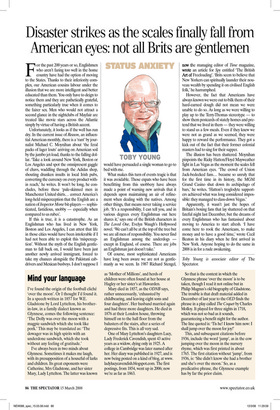Mind your language
I’ve found the origin of the football cliché ‘over the moon’. Or I thought I’d found it. In a speech written in 1857 for W.E. Gladstone by Lord Lyttelton, his brotherin-law, in a family dialect known as Glynnese, comes the following sentence: ‘The Dolly was over the moon with a magpie sandwich which she took like pork.’ This may be translated as: ‘The dowager was in high spirits with an underdone sandwich, which she took without any feeling of gratitude.’ I’ve always been in two minds about Glynnese. Sometimes it makes me laugh, with its presupposition of a houseful of larks and children. Its great exponents were Catherine, Mrs Gladstone, and her sister Mary, Lady Lyttelton. The latter was known as ‘Mother of Millions’, and herds of children were often found at her house at Hagley or her sister’s at Hawarden.
Mary died in 1857, as the ODNB says, rather unnecessarily, ‘exhausted by childbearing, and leaving eight sons and four daughters’. Her husband married again and had three more daughters. He died in 1876 at their London house, throwing himself on to the hall floor from the balusters of the stairs, after a series of depressive fits. This is all very sad.
One of Mary Lyttelton’s daughters Lucy, Lady Frederick Cavendish, spent 43 active years as a widow, dying only in 1925. A college in Cambridge was later named after her. Her diary was published in 1927, and is now being posted on a kind of blog, at www. ladylucycavendish.blogspot.com. The first postings, from 1854, went up in 2006; now we’re as far as 1863. So that is the context in which the Glynnese phrase ‘over the moon’ is to be taken, though I read it not online but in Philip Magnus’s old biography of Gladstone. The trouble is that draft material added in December of last year to the OED finds the phrase in a play called The Coquet by Charles Molloy. It played for three nights in 1718, which was not so bad as it sounds, guaranteeing a benefit night for the author. The line quoted is: ‘Tis he! I know him now: I shall jump over the moon for joy!’ This, and subsequent citations before 1936, include the word ‘jump’, as in the cow jumping over the moon in the nursery rhyme, which was first printed in about 1765. The first citation without ‘jump’, from 1936, is: ‘She didn’t know she had a brother and she’s over the moon.’ So, as a predicative phrase, the Glynnese example has by far the prior claim.


























































































 Previous page
Previous page